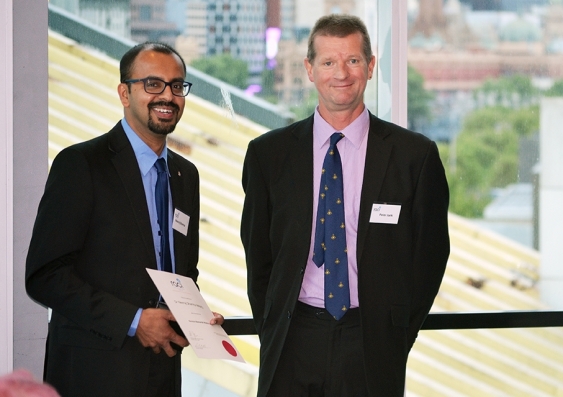Young achiever of chemistry wins Rennie Memorial Medal
Dr Neeraj Sharma has won the Rennie Memorial Medal which recognises his remarkable achievements in less than eight years of professional work.
Dr Neeraj Sharma has won the Rennie Memorial Medal which recognises his remarkable achievements in less than eight years of professional work.

Dr Neeraj Sharma of UNSW’s School of Chemistry has been recognised as an up-and-coming talent of Australian chemical science by winning the prestigious Rennie Memorial Medal.
Awarded by the Royal Australian Chemical Institute (RACI) for a chemist who has had an impact in less than eight years of professional experience, the win was part of the RACI’s National Awards dinner held last Friday.
The Rennie Memorial Medal is regarded by many as the premier award offered annually by RACI to a young chemist, with the list of past winners reading as a who’s who of leaders in their fields of chemical science.
Dr Sharma said he is very honoured to receive this award.
“It is awesome to be recognised from the peak body of chemists in Australia,” he said.
“It is also very humbling to see that the work we are doing is making an impact for chemistry and science in Australia and being recognised as such.
“The award is not only for me but for my team of absolutely awesome students, my collaborators and colleagues and the staff at UNSW who are continuously supporting our work and who make UNSW such a friendly and exciting place to work at.”
Dr Sharma, who is Senior Lecturer and an ARC DECRA fellow, has made his name by designing new materials for improved electrochemical devices. Specifically, he has analysed the performance of devices such as batteries at the atomic scale by applying synchrotron or neutron diffraction.
The remarkable feature of his work – and why Dr Sharma is seen as a leader in his field – is that the performance analysis is carried out in situ inside a working battery. Most other similar analysis occurs ex situ in the simulated conditions of a laboratory.
“Most research looks at pure compounds and using techniques like X-ray diffraction, one can model where all the atoms are in the structure,” Dr Sharma said when describing his work.
“We look at compounds inside batteries using the same technique. So rather than a pure compound we have a complex battery, and we can essentially take a video at the atomic scale of how components inside that battery evolve while the whole device works.
“This is very powerful as it allows us to produce atomic-level information from a complex device.”
By pursuing his ‘real world’ in situ examination of battery materials at the atomic level, Dr Sharma is helping scientists and engineers develop fundamentally better materials suited for battery applications and hence better devices.
At a time when renewable energy sources and energy storage devices like lithium ion batteries are hot areas of research, Dr Sharma’s analytical achievements continue to push the frontier in energy technology.
UNSW Dean of Science, Professor Emma Johnston AO said she was excited for Dr Sharma to have his research recognised with such a prestigious award.
“Dr Sharma receiving the Rennie Memorial Medal is an outstanding validation of the very important work he is doing in electrochemical energy technology,” she said.
“He is a fantastic educator and contributor to the UNSW Science community, and I look forward to seeing what other advances to this field of chemical science he will bring.”